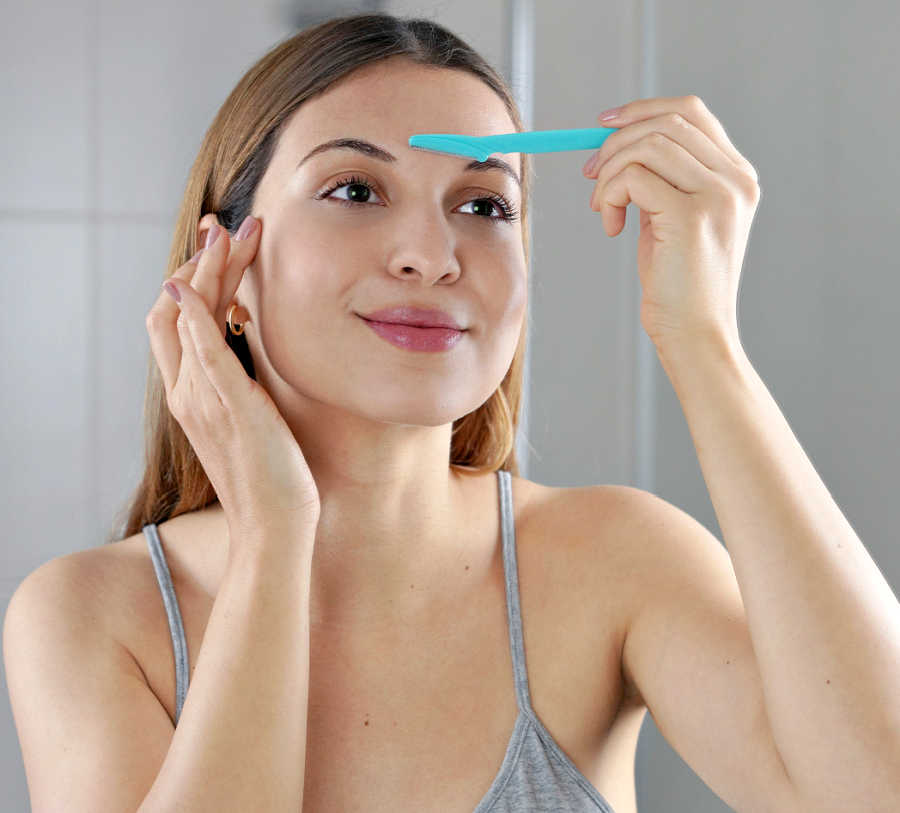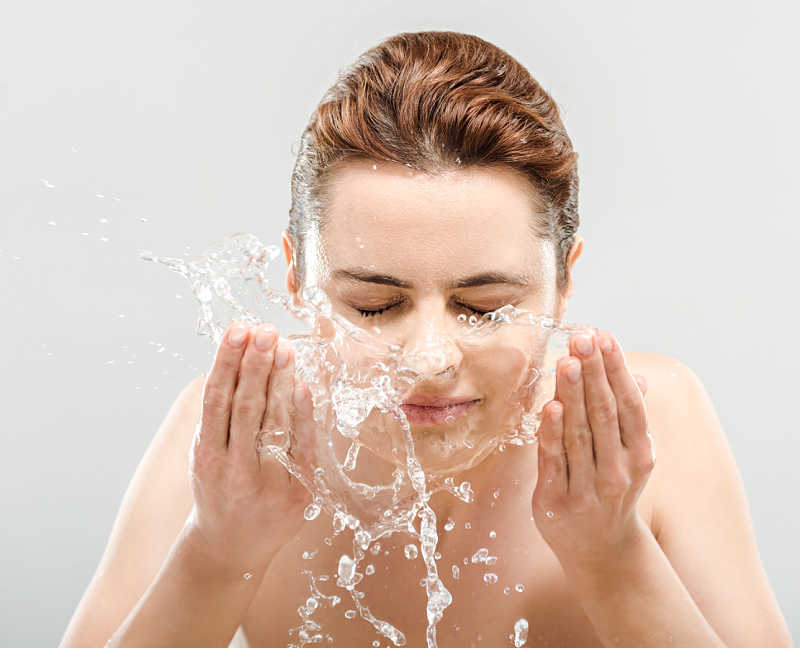- Home
- Skincare Guide
- Exfoliation Guide
- Vitamin C & Dermaplaning
Vitamin C After Dermaplaning Tips for Brighter, Calmer Skin
Using vitamin C after dermaplaning can give your skin a beautiful glow — as long as the formula isn’t too strong. After dermaplaning, your skin is smooth, fresh, and extra-absorbent, so serums sink in fast… which is great unless the vitamin C stings or irritates.
I personally love this combo because my skin always looks brighter and more even afterward — especially those little dark spots that take forever to fade. But my face can feel tender right after dermaplaning, so choosing the right type of vitamin C makes a big difference.
Below, I’ll show you what works, what to avoid, and how to apply vitamin C after dermaplaning without irritation.

What does Dermaplaning do?

Dermaplaning is a deep exfoliating treatment that gently removes dead skin cells and peach fuzz with a surgical-style blade.
The result? A super-smooth, freshly polished surface that makes makeup glide and serums absorb more evenly.
I notice this most when I pair it with vitamin C — those stubborn little dark spots start to lift faster because the old, dull cells shed more easily after dermaplaning.
If you want a bigger-picture look at how exfoliation supports aging skin, here’s my guide to the benefits of exfoliating over 40.
This process leaves your skin incredibly smooth and fresh. See how you can try this exfoliating treatment yourself at home.
If you’re curious how it compares to other exfoliating methods, here’s my breakdown of dermaplaning vs microdermabrasion — especially helpful if you’re deciding which one plays nicer with sensitive or over-40 skin.
The benefits of vitamin C after dermaplaning
Vitamin C works especially well on freshly exfoliated skin because it supports radiance, collagen, and a more even tone — all things mature skin loves.
Here’s what this combo can help with:
Brighter, more even-looking skin
Dermaplaning removes the dull surface layer, giving vitamin C a clear path to work. This is where I personally see the biggest difference — those tiny dark spots soften faster. If you want to go deeper into how this antioxidant works, here’s my guide to vitamin C for skin.
Supports collagen for a firmer look
Vitamin C encourages collagen production and helps protect existing collagen from free-radical damage. Pairing it with dermaplaning can make skin look smoother and subtly lifted over time.
Helps discoloration fade more efficiently
With fewer dead cells blocking the way, vitamin C can reach the layers where pigment forms. This supports a more even complexion and can help fade old sun spots with consistent use.
(Still use sunscreen every day — PA+++ if you can.)
Vitamin C brightens and evens out the skin tone
One thing I love about vitamin C is how it helps your complexion look brighter and more even — especially if you’re dealing with dark spots or old discoloration. Dermaplaning makes this even better because you’re removing those dull surface cells first.
Vitamin C also helps calm excess pigment production, which is why spots can slowly look lighter with consistent use. It’s not instant, but pairing it with dermaplaning gives those stubborn marks a little extra push.
And of course, sunscreen is a must if you’re working on dark spots or brightening. I always look for formulas with strong UVA protection (PA+++ or higher) since UVA is what deepens pigmentation.
How to apply vitamin C after dermaplaning

Right after dermaplaning, your skin is extra smooth and a little more sensitive, so gentle steps matter. Here’s the simple routine I use:
1. Start with a mild cleanser
Just rinse or lightly cleanse to remove any leftover oil or debris. Your skin should feel clean, not tight.
2. Apply a gentle vitamin C serum
Choose a calm, mid-strength formula — something your skin already likes. This isn’t the time for the strongest L-ascorbic acid. If you want options, I explain the gentler types on my vitamin C for skin page.
3. Follow with soothing moisture
A hydrating moisturizer helps lock everything in and keeps your skin comfortable while the vitamin C works.
4. Skip strong exfoliants or retinol for the day
Your skin just had its exfoliation. I save my retinol for a different night. If you want a deeper comparison of exfoliating methods, here’s my guide to dermaplaning vs microdermabrasion.
5. Always use sunscreen the next morning
Dermaplaning + vitamin C = a brighter glow, but also more sun sensitivity. A good SPF keeps your results and prevents new spots.
Tips: What type of vitamin C serum to use
Choosing the right vitamin C after dermaplaning matters — your skin is freshly exfoliated, extra absorbent, and a little more reactive.
The goal is to brighten and support collagen without stinging or irritation.
Here’s how to break it down by skin type:
Normal skin
If your skin isn’t sensitive and you’ve used strong vitamin C before, you can usually handle a 15–20% L-ascorbic acid serum. It’s the most potent form and gives great brightening benefits.
Personal pick: A simple 20% L-ascorbic acid serum with vitamin E or rosehip oil feels nice and doesn’t compete with other skincare.
Sensitive skin
If your skin gets red or reactive easily, stick with 5–10% vitamin C or a gentler oil-soluble form like tetrahexyldecyl ascorbate (THD). It still brightens but won’t overwhelm freshly exfoliated skin. CeraVe’s 10% vitamin C is another comfortable option.
Dry, mature, or crepey skin
Your skin may appreciate a little more hydration. Look for vitamin C serums that also include hyaluronic acid or nourishing oils to buffer any dryness.
Example: A booster you can mix into your moisturizer works well on days your skin feels extra thirsty.
Vitamin C Serum After Dermaplaning: Summary
Using vitamin C after dermaplaning can give your skin a brighter, smoother look — especially if your skin already handles vitamin C well.
Dermaplaning leaves a fresh, polished surface, which helps your serum spread and absorb more evenly. That’s why so many people notice extra glow when they pair the two.
The only real rule? Pick a formula that matches your skin’s tolerance and avoid anything too strong right after exfoliating. Comfort first — calm, happy skin always responds best.
Linda's go-to vitamin C picks
If you’re looking for vitamin C options that play nicely with exfoliated skin, these are the ones I’ve personally had the best luck with.
My vitamin C favorites that work well after dermaplaning:
(gentle, glow-boosting, and good for mature skin)
- CeraVe 10% Skin Renewing Vitamin C Serum — great for most skin types, especially if you want something gentle but effective.
- THD (oil-soluble) Vitamin C Serum — absorbs beautifully and is usually the easiest on freshly exfoliated skin.
- Zenmed Vitamin C Booster — perfect if you want to add vitamin C to your favorite moisturizer.
Some links may be affiliate links, which means I may earn a small commission at no extra cost to you. I only share products I personally use or genuinely recommend.
Q&A: Applying vitamin C serum after dermaplaning
Q: Can I use vitamin C serum before dermaplaning?
Q: Can I use vitamin C serum before dermaplaning?
A: No — dermaplaning should always be done on clean, dry skin.
If your skin is extra sensitive, you can use a tiny amount of face oil for glide, but avoid all serums before the treatment.
Q: What other serums can I use after dermaplaning at home?
Q: What other serums can I use after dermaplaning at home?
A: Hyaluronic acid is a safe go-to because it hydrates without irritation.
Avoid exfoliating acids (glycolic, lactic, AHAs), retinol, and strong actives for a few days.
If you’re not sure what counts as an exfoliant, my gentle exfoliation tips page breaks everything down in simple terms.
Q: What Should You Avoid After Dermaplaning at home?
Q: What Should You Avoid After Dermaplaning at home?
A: skip anything strong or exfoliating — harsh cleansers, scrubs, acid toners, and retinol. Stick with calming hydration for the first 24–48 hours. See how to care for your face after dermaplaning at home.
Q: What is the best hydrating serum after dermaplaning?
Q: What is the best hydrating serum after dermaplaning?
A: There’s no single “best,” but the safest picks are gentle formulas with:
- • hyaluronic acid
- • ceramides
- • essential fatty acids
- • non-fragrant oils
These ingredients replenish moisture without stinging freshly exfoliated skin.
Q: Can I use vitamin C oil after dermaplaning?
Q: Can I use vitamin C oil after dermaplaning?
A: Possibly — just patch test first. Vitamin C is still acidic, even in an oil base, so some formulas may tingle or irritate. Choose a gentle, hydrating version and avoid anything labeled “brightening” + “high strength.”
Q: Why can't you use retinol after dermaplaning?
Q: Why can't you use retinol after dermaplaning?
A: Retinol is an exfoliating active, and pairing it with dermaplaning can cause redness, peeling, and irritation. Wait several days before restarting your retinol routine. If you're easing back into your routine, these retinol routine tips can help you restart without irritation.
Want More?
I share quick routines, beauty tweaks, and what’s working for me — straight to your inbox. Join the Club and get this free Cheek Shaper Video.
About the Author:
Linda Robison is a Facial Fitness Specialist and the founder of Anti-Aging Beauty Zone. With decades of hands-on experience, she shares practical, natural ways to lift and brighten mature skin—without expensive or invasive treatments.
Before you go ....
Please tap on the💙in the bottom right corner if you found this page helpful.
FOLLOW ME FOR MORE TIPS:
SHARE OR SAVE FOR LATER:




